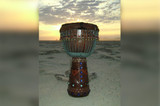What Type of Drummer are You?
Drummers are as diverse as the rhythms played and the drums and methods used to bring those sounds to life. From the novice drummer given a set of bongos to the professional stage drummer, the personalities of these individuals are all rooted in the same basic drive of keeping the beat and holding a rhythm together. This rhythm may be a personal song played alone, or a group endeavor within a drum circle that encourages improvisation. Some drummers practice their craft and are confident enough to move beyond the basement or casual drum circle and can facilitate the circles or even get on stage or in a studio, sharing the love of rhythm with the world.
With the different options available to drummers, the ways in which a drummer can express his or her personality begin to diverge not only in venue, but also in style. Drummers may excel at keeping a rhythm throughout a song, maintaining a steady beat without embellishment that gives the other players and participants a chance to bring out their own unique styles. Other drummers can take these basic rhythms and add to the magic through fills and improv, never taking away from the music, but still showcasing their drumming and rhythm skills in a supportive manner. Then, there are the power drummers who may not be able to control the inspiration that is felt and let their own beats fly, forgetting the other members in attendance or the audience and expressing their drumming style, technique and talent to its highest level.
Some drummers are able to adapt to the different types of drums available, while others may specialize in one particular djembe or a niche of percussion instruments like conga drums and bongos. Stage and studio drummers may shy away from the ancestral beats of African drums, choosing to beat on snares and toms, while a devout udu drummer may not see the need for drum sticks or cymbals. Electronic and even video game drumming allow for a certain method and style of rhythmic expression that can encourage an entire new genre of computer-enhanced beats.
The style and type of drums and drumming that a person chooses reflects a unique personality, ambition and musical preference. No matter the drumming style or affinity, drummers are found in all cultures, all niches and all genres of music. Some drummers are natural soloists, while others excel at keeping an entire orchestra or drum circle together. Many drummers prefer jazz or rock drumming, while others find peace in drum circles. Whether its for accuracy, creativity or speed, the drummer has the ability to perform and lead a song while still having fun and sharing the love for rhythm and music. It is the spirit of the drum and sharing the essence of drumming that makes those beats personal and special.
Recent Posts
-
What is the Best Size Djembe for Beginners?
If you're new to the world of percussion and interested in learning the djembe, you're in for a t …16th Jul 2024 -
The Benefits of Becoming a Drumming Teacher: Transforming Passion into Profession
Why become a drumming teacher? Becoming a drumming teacher is an excellent way to share your pas …22nd May 2024 -
What Makes the Djembe Drum a Spiritual Instrument in African Music?
Origin and history of the Djembe drum The Djembe drum originates from West Africa and holds sign …16th May 2024



